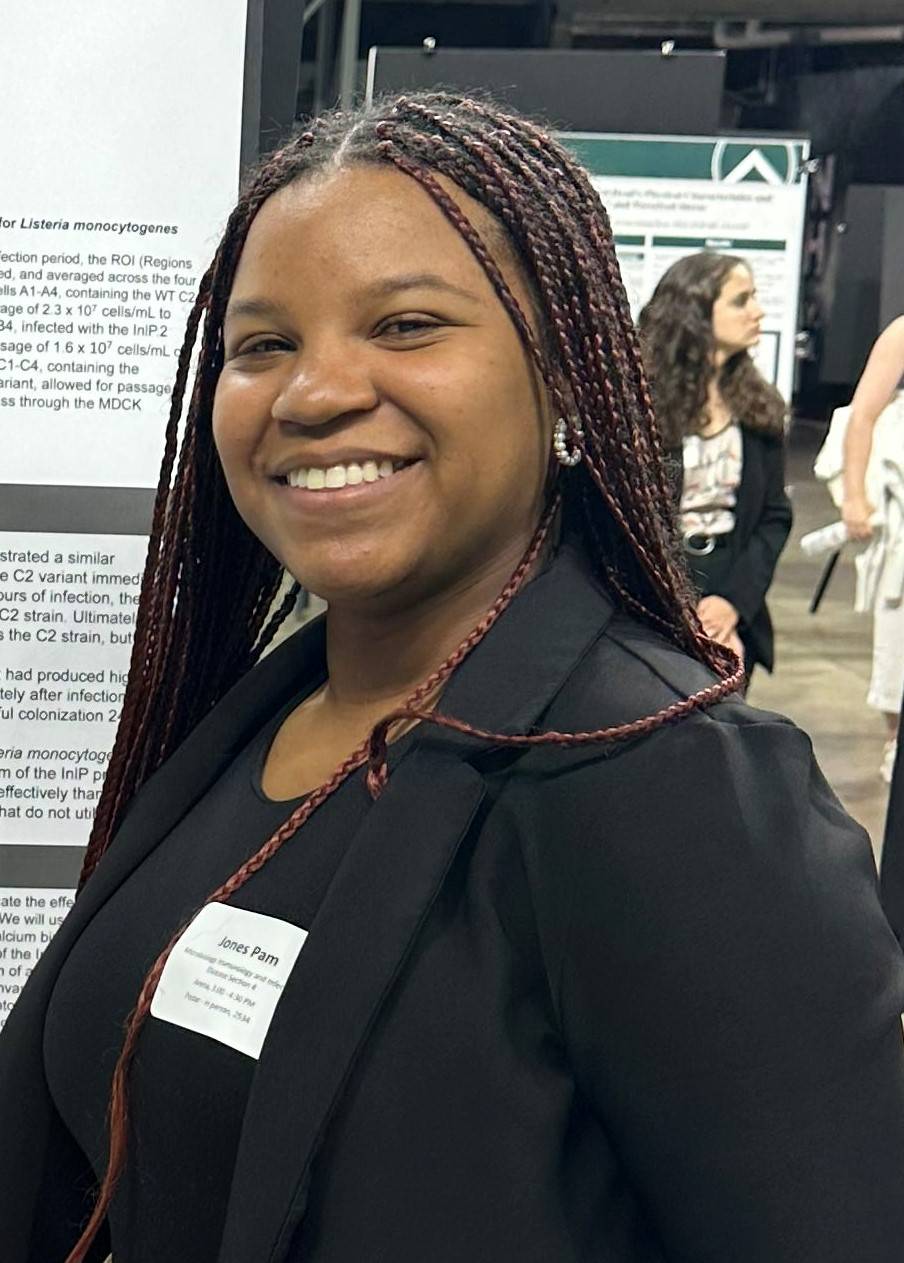Pam Jones
 |
Hometown: Clinton Township, MIMajor: MicrobiologyMinor: Fermented Beverage Science & TechnologyClass Level: Senior (graduating)College(s): Honors College & NatSci |
Pam hails from Clinton Township, Michigan, where she grew up with 2 older brothers and one twin brother, who also shares her love of science. She was motivated to join the Spartan family by her mom, a fellow Spartan who attended MSU in 1986!
Along with her love of biology is her love for the arts, especially music which she has been involved with since the 4th grade. She feels incredibly lucky to have continued to pursue her passion for music and singing at MSU.
Her career goal is to practice as an obstetrician-gynecologist or as a neonatologist. As she continues her forays in science and medicine, she also plans to give back to the art programs that gave her so much throughout developmental years as well as furthering the integration and fusion of the arts and science.
Pam’s reflections of her research experience:
“My research experience has taught me that the work we do here at MSU has almost immediate real-world implications. We look at the mechanism of action for Listeria infections which is a common foodborne pathogen.
It is so incredible to see how my work directly translates to protecting vulnerable people.”
THE ROLE OF INLP IN LISTERIA MONOCYTOGENES COLONIZATION
Mentor(s): Jonathan Hardy, Ph.D. and Kayla Conner, Ph.D.
Pregnancy is a very strenuous physiological state for the body. It comes with various side effects like vomiting, high blood pressure, diabetes, and immune system deficiency. Additional issues like prenatal infections can lead to adverse pregnancy outcomes such as miscarriage, stillbirth, and preterm labor. A pathogen commonly associated with prenatal infections is Listeria monocytogenes (Lm). Listeria monocytogenes is commonly found as a food contaminant. Lm infections are very dangerous to immunocompromised people, such as pregnant women. Animal models of pregnancy-associated listeriosis have demonstrated its ability to induce preterm labor but the exact mechanisms underlying this outcome are unknown. It is known that Lm can cross many physiological barriers, allowing it to colonize the placenta. A gene rumored to aid in Listeria's ability to cross the placenta's layers is Internalin P (InlP). Our lab has found natural variations of InlP present in even avirulent Listeria. The goal of this project is to investigate the effects/usage of this gene in the process of cell invasion. These variants might carry out differing degrees of cell invasion and can clue us in about the evolution of Lm's virulence.
Poster
Pam has shared what it means to be a Drew scholar:
“The Drew Scholars program introduced me to some of my closest friends and helped me gain a sense of community during my first year at MSU. With the pandemic hitting in Spring 2020, keeping in contact with the Drew community was integral to my mental health.
I'd like to thank Dr. Caldwell and Ariel Robbins for all they did to keep everyone connected throughout that year! Their mentorship truly laid the foundation for my college career.”
MMG 301 Undergraduate Learning Assistant, Department of Microbiology
Co-President and Business Manager, Ladies First a Cappella
Undergrad Research Assistant, Hardy Lab
1st Place in Microbiology & Infectious Disease Category, UURAF 2022
Outstanding Presentation in Microbiology, Annual Biomedical Research Conference for Minoritized Scientist (ABRCMS)
Outstanding Student Leader and Outstanding Student Presentation, Medical Mentors Pipeline Program
Here is advice to from Pam to peers and successors:
“Try new things!
I didn't think I would enjoy doing research here at MSU. Now, I'm immersed in the world of microbiology and it has afforded me opportunities I couldn't have ever fathomed. In just my first two years in my lab I won awards both at MSU and national conferences. Get out of your comfort zone!!”